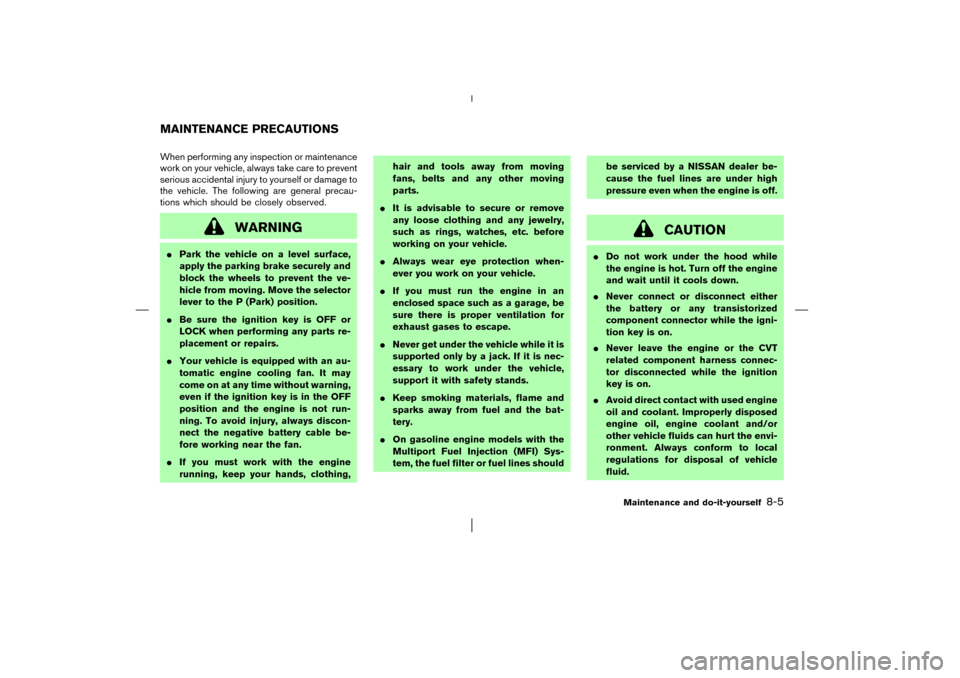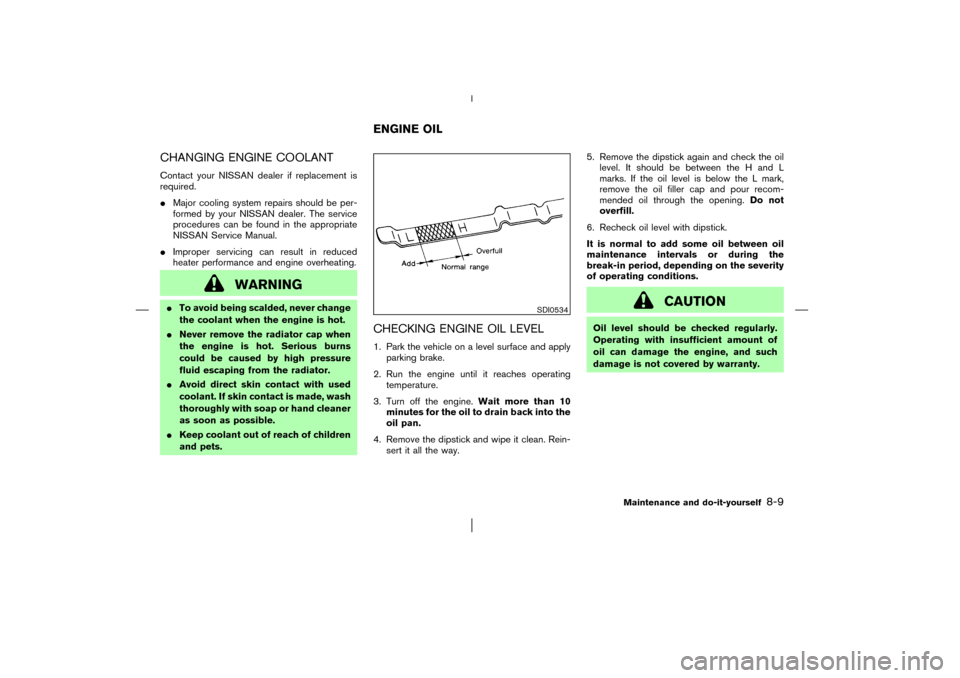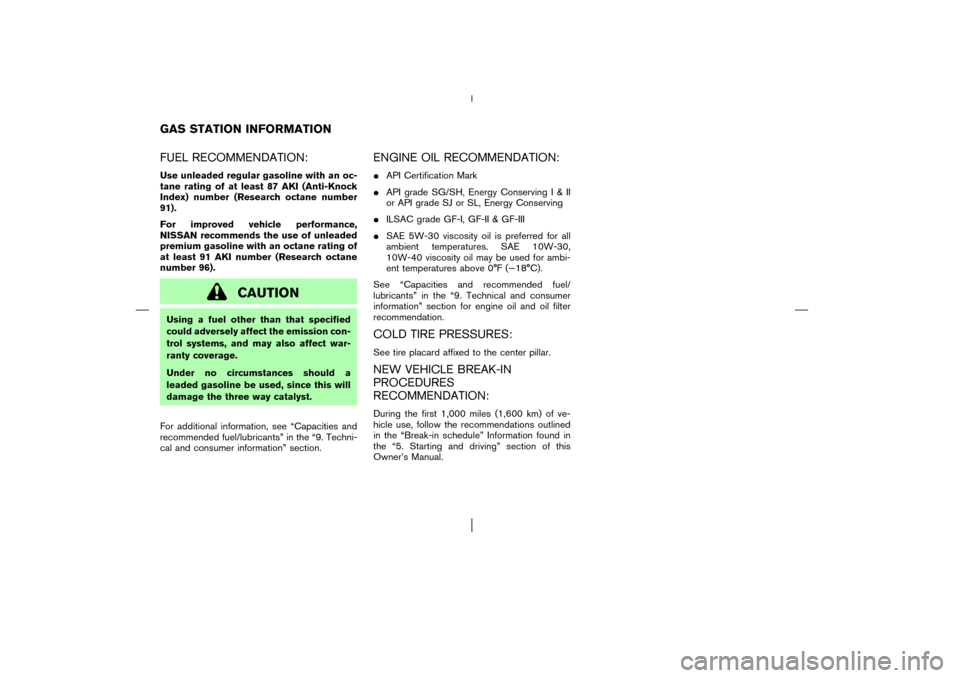Page 200 of 265

When performing any inspection or maintenance
work on your vehicle, always take care to prevent
serious accidental injury to yourself or damage to
the vehicle. The following are general precau-
tions which should be closely observed.
WARNING
�Park the vehicle on a level surface,
apply the parking brake securely and
block the wheels to prevent the ve-
hicle from moving. Move the selector
lever to the P (Park) position.
�Be sure the ignition key is OFF or
LOCK when performing any parts re-
placement or repairs.
�Your vehicle is equipped with an au-
tomatic engine cooling fan. It may
come on at any time without warning,
even if the ignition key is in the OFF
position and the engine is not run-
ning. To avoid injury, always discon-
nect the negative battery cable be-
fore working near the fan.
�If you must work with the engine
running, keep your hands, clothing,hair and tools away from moving
fans, belts and any other moving
parts.
�It is advisable to secure or remove
any loose clothing and any jewelry,
such as rings, watches, etc. before
working on your vehicle.
�Always wear eye protection when-
ever you work on your vehicle.
�If you must run the engine in an
enclosed space such as a garage, be
sure there is proper ventilation for
exhaust gases to escape.
�Never get under the vehicle while it is
supported only by a jack. If it is nec-
essary to work under the vehicle,
support it with safety stands.
�Keep smoking materials, flame and
sparks away from fuel and the bat-
tery.
�On gasoline engine models with the
Multiport Fuel Injection (MFI) Sys-
tem, the fuel filter or fuel lines shouldbe serviced by a NISSAN dealer be-
cause the fuel lines are under high
pressure even when the engine is off.
CAUTION
�Do not work under the hood while
the engine is hot. Turn off the engine
and wait until it cools down.
�Never connect or disconnect either
the battery or any transistorized
component connector while the igni-
tion key is on.
�Never leave the engine or the CVT
related component harness connec-
tor disconnected while the ignition
key is on.
�Avoid direct contact with used engine
oil and coolant. Improperly disposed
engine oil, engine coolant and/or
other vehicle fluids can hurt the envi-
ronment. Always conform to local
regulations for disposal of vehicle
fluid.
MAINTENANCE PRECAUTIONS
Maintenance and do-it-yourself
8-5
�
03.1.28/Z50-D/V5.0
�
Page 204 of 265

CHANGING ENGINE COOLANTContact your NISSAN dealer if replacement is
required.
�Major cooling system repairs should be per-
formed by your NISSAN dealer. The service
procedures can be found in the appropriate
NISSAN Service Manual.
�Improper servicing can result in reduced
heater performance and engine overheating.
WARNING
�To avoid being scalded, never change
the coolant when the engine is hot.
�Never remove the radiator cap when
the engine is hot. Serious burns
could be caused by high pressure
fluid escaping from the radiator.
�Avoid direct skin contact with used
coolant. If skin contact is made, wash
thoroughly with soap or hand cleaner
as soon as possible.
�Keep coolant out of reach of children
and pets.
CHECKING ENGINE OIL LEVEL1. Park the vehicle on a level surface and apply
parking brake.
2. Run the engine until it reaches operating
temperature.
3. Turn off the engine.Wait more than 10
minutes for the oil to drain back into the
oil pan.
4. Remove the dipstick and wipe it clean. Rein-
sert it all the way.5. Remove the dipstick again and check the oil
level. It should be between the H and L
marks. If the oil level is below the L mark,
remove the oil filler cap and pour recom-
mended oil through the opening.Do not
overfill.
6. Recheck oil level with dipstick.
It is normal to add some oil between oil
maintenance intervals or during the
break-in period, depending on the severity
of operating conditions.
CAUTION
Oil level should be checked regularly.
Operating with insufficient amount of
oil can damage the engine, and such
damage is not covered by warranty.
SDI0534
ENGINE OIL
Maintenance and do-it-yourself
8-9
�
03.1.28/Z50-D/V5.0
�
Page 264 of 265

FUEL RECOMMENDATION:Use unleaded regular gasoline with an oc-
tane rating of at least 87 AKI (Anti-Knock
Index) number (Research octane number
91).
For improved vehicle performance,
NISSAN recommends the use of unleaded
premium gasoline with an octane rating of
at least 91 AKI number (Research octane
number 96).
CAUTION
Using a fuel other than that specified
could adversely affect the emission con-
trol systems, and may also affect war-
ranty coverage.
Under no circumstances should a
leaded gasoline be used, since this will
damage the three way catalyst.
For additional information, see “Capacities and
recommended fuel/lubricants” in the “9. Techni-
cal and consumer information” section.
ENGINE OIL RECOMMENDATION:�API Certification Mark
�API grade SG/SH, Energy ConservingI&II
or API grade SJ or SL, Energy Conserving
�ILSAC grade GF-I, GF-II & GF-III
�SAE 5W-30 viscosity oil is preferred for all
ambient temperatures. SAE 10W-30,
10W-40 viscosity oil may be used for ambi-
ent temperatures above 0°F (−18°C).
See “Capacities and recommended fuel/
lubricants” in the “9. Technical and consumer
information” section for engine oil and oil filter
recommendation.COLD TIRE PRESSURES:See tire placard affixed to the center pillar.NEW VEHICLE BREAK-IN
PROCEDURES
RECOMMENDATION:During the first 1,000 miles (1,600 km) of ve-
hicle use, follow the recommendations outlined
in the “Break-in schedule” Information found in
the “5. Starting and driving” section of this
Owner’s Manual.
GAS STATIONINFORMATION
�
03.1.28/Z50-D/V5.0
�